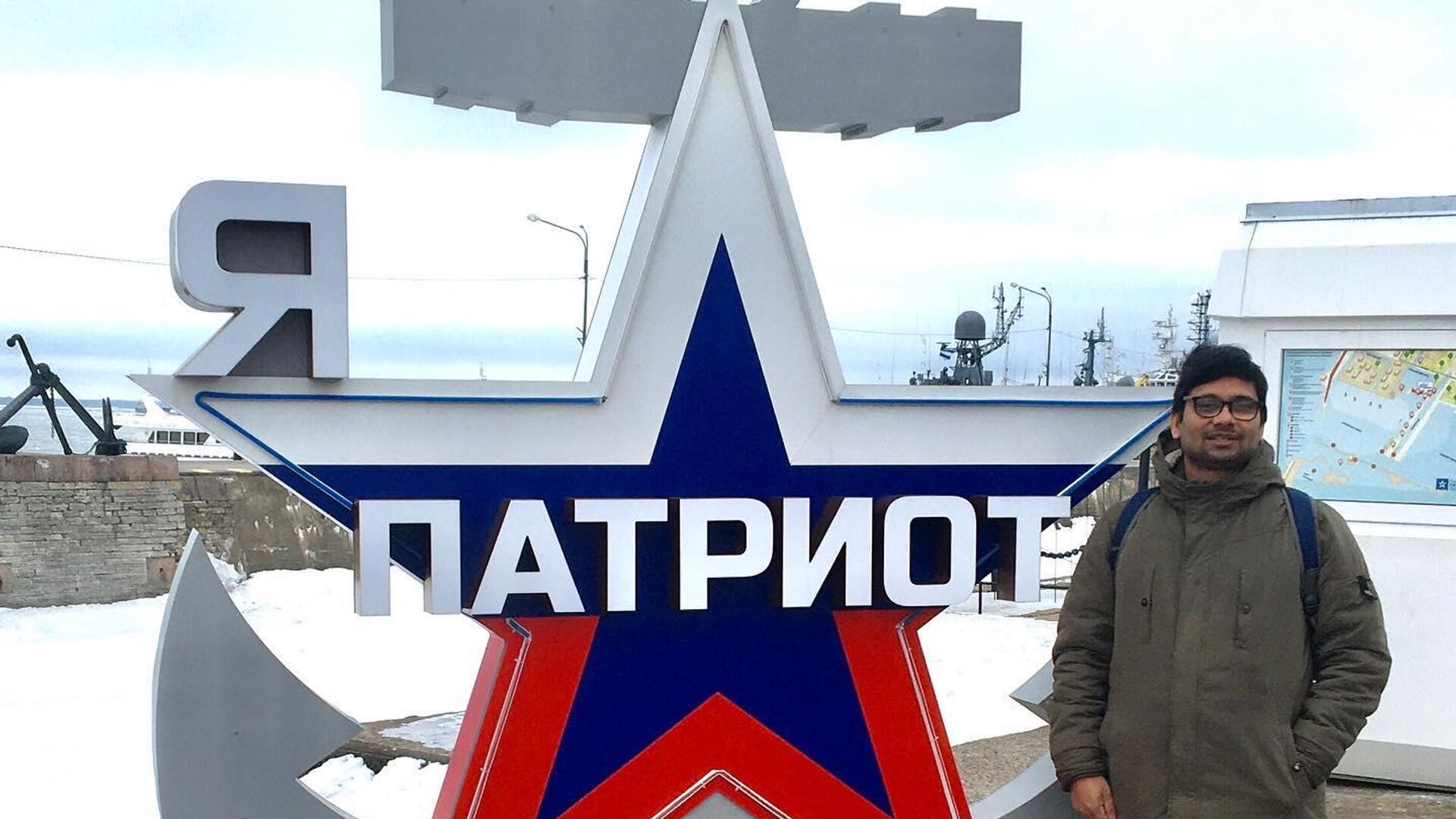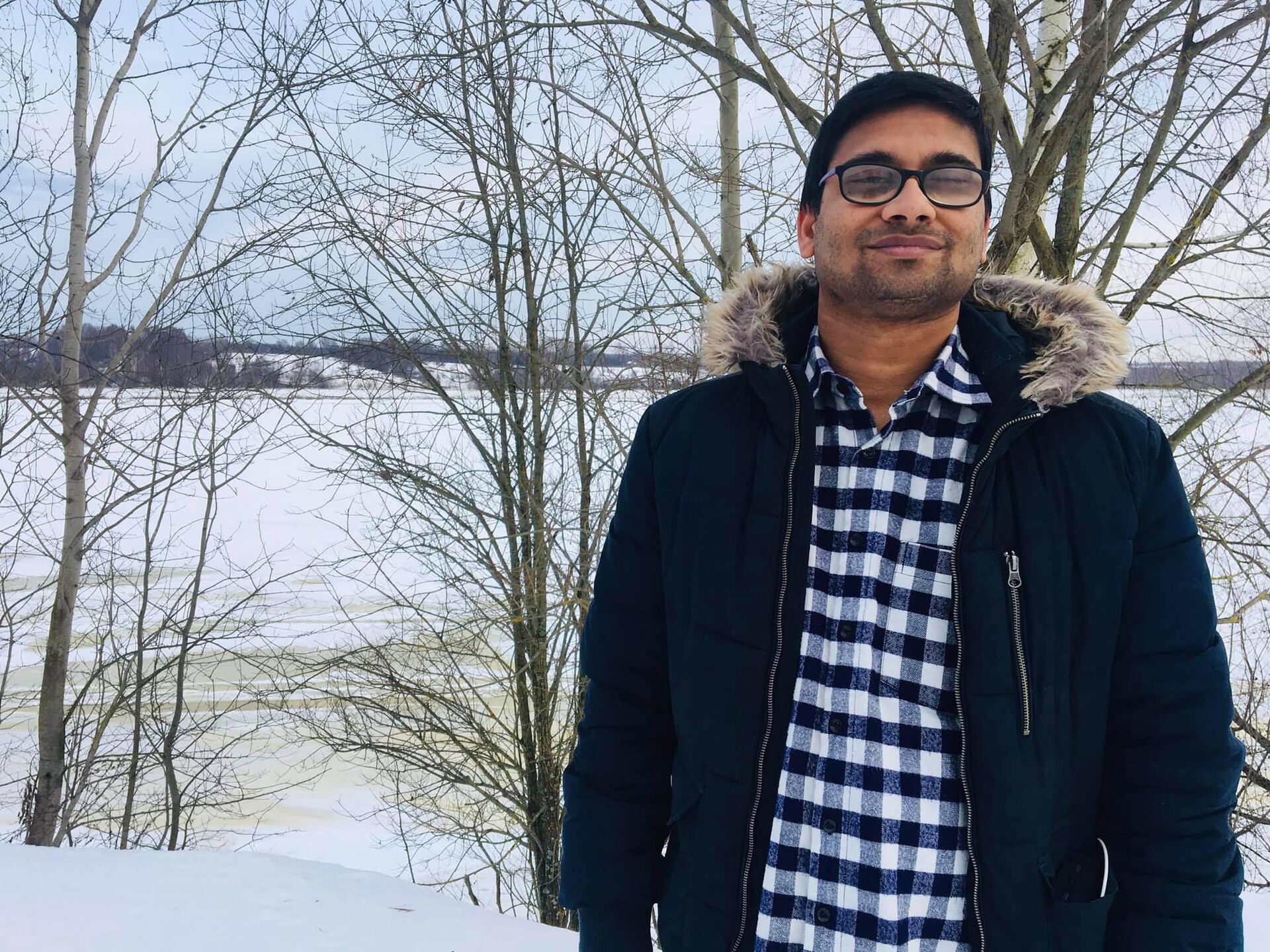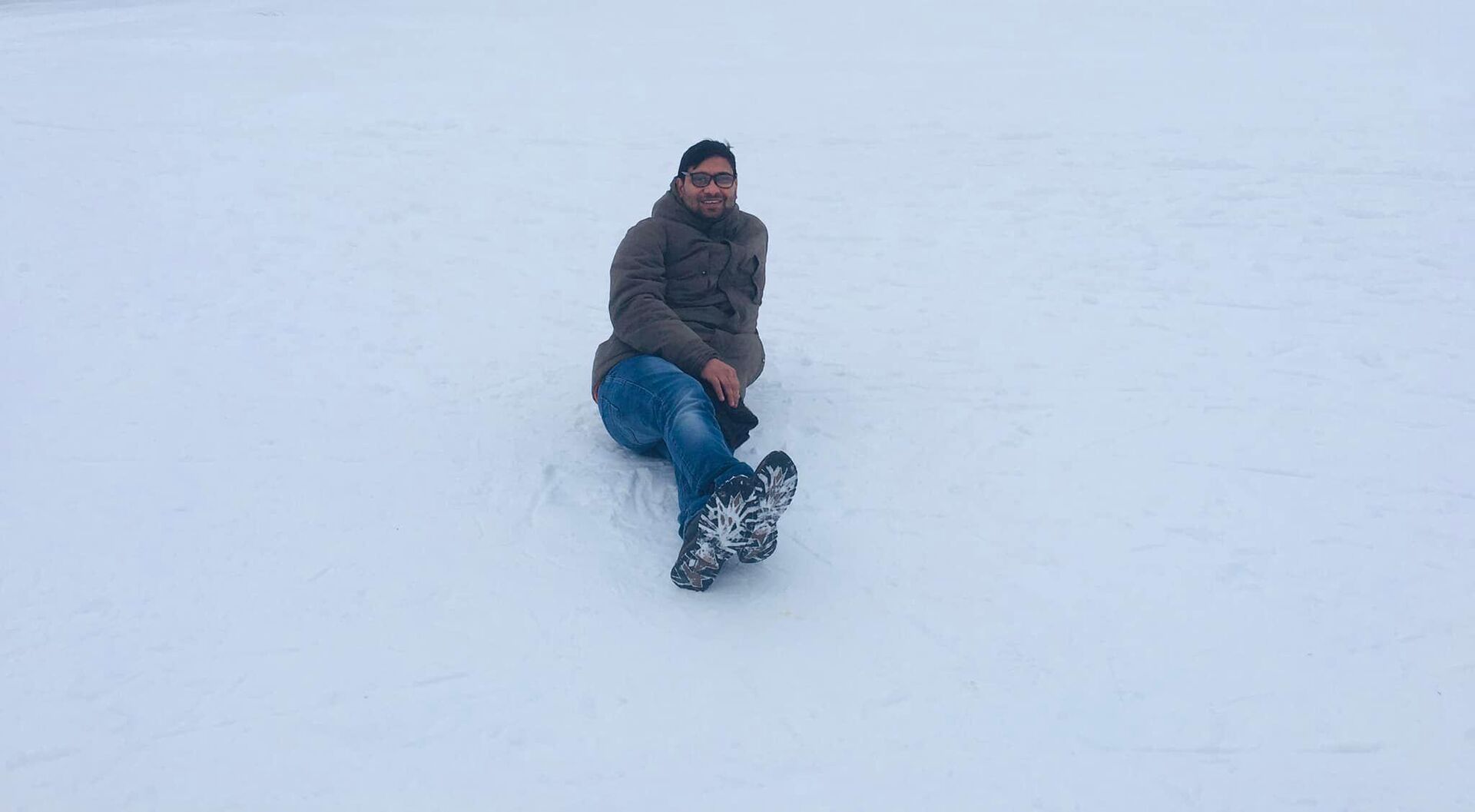https://sputniknews.in/20240708/in-heart-image-a-whisper-from-childhood-7808821.html
In-Heart Image: A Whisper From Childhood
In-Heart Image: A Whisper From Childhood
Sputnik India
Modern youth mostly seeks to gain higher education and doing research worldwide. Young scientist Gautam Kashyap, who found himself studying in Russia, told how... 08.07.2024, Sputnik India
2024-07-08T08:00+0530
2024-07-08T08:00+0530
2024-07-09T16:37+0530
indo-russian relations
leo tolstoy
russia
india
varanasi
new delhi
delhi
https://cdn1.img.sputniknews.in/img/07e8/07/09/7808637_0:210:1441:1020_1920x0_80_0_0_2bc9cc9e1bd7145e6777c20dc251a89f.jpg
Gautam Kashyap is a postgraduate of the Russian Chelyabinsk’s South Ural State University in theoretical, applied and comparative linguistics.He chose to improve his professional skills in Russia, as he was impressed by the country since childhood when he got a feel of what it is."There was no television in our region; therefore we usually listened to the radio for fun. My grandfather would always choose for us a ‘Voice of Russia’, where quality programmes about life in Russia, the nation’s literature, culture and politics to be broadcast on Hindi. Oftentimes I used to write letters to the radio host, where I asked questions about Russia, and the programme stuff would reply to me. Several times I even received gifts from them by mail," Kashyap shared.As a child, Kashyap also read Russian and Soviet literature translated into Hindi from his grandfather’s library. Thus, even with lack of Russian language, works of classics such as Pushkin, Lermontov, Tolstoy, Chekhov, Dostoevsky, Bulgakov, Gamzatov, Akhmatova, Tsvetaeva, Gumilyov, Balmont and other authors were well known to the boy.The decision to get an education in Russia was taken spontaneously. The young man studied in Varanasi, where he often met Russian tourists. Later, in Delhi, he joined a medical company, focused on providing healthcare service to foreigners. Most of them were from Russia and CIS countries; therefore, every day, he had an opportunity to communicate with Russian-speakers."While I was volunteering in Kullu for The International Roerich Memorial Trust (IRMT), which preserves and promotes the legacy of the outstanding Russian family of Roerich, I assisted Russian delegations. This experience linked me to Russia, and far before I visited the country, I had a wide range of friends almost in every city," he stressed.He then received a scholarship from the Russian government and his master’s degree from the Saint Petersburg State University in the field of Russian Literature."I came back to India and worked as a freelance interpreter. In addition, on social media platforms, I started writing about Russia, based on the Russian newspapers’ information. Many news channels found my articles and reports interesting, and "Aaj Tak" and "News 18 Hindi" started inviting me to discussions. Moreover, many Indian newspapers have quoted my reports. Eventually, I started cooperating with a few Russian and Indian news platforms, translating news from Russian into Hindi and vice versa. This motivated me to learn more and more about Russia," he emphasized.In 2003, Kashyap applied for Open Doors: Russian Scholarship Project and was selected as a fellow to follow his postgraduate studies. That year, all the project’s experts were linguistic discipline specialists. Kashyap’s choice was linguistics too, so he began to pursue his research in translation.Gautam confirmed from his own experience that the university provides extensive opportunities for scientific research, primarily due to the support of scientific supervisors and teachers."My scientific supervisor, Olga Solopova, and other teachers offer assistance beyond regular working hours, helping with scientific writing, editing, proofreading, and reviewing. I have never encountered such a level of mentorship and dedication before. This greatly aids my research," he emphasized.In addition to personalized guidance, SUSU provides access to an extensive library and electronic resources necessary for conducting research, supports scientific projects and initiatives, and offers participation in grant programs and competitions, Gautam noted."I am interested in political discourse, and my scientific supervisor gave me the opportunity to work on the research project 'Modeling the Image of Russia in the Media Discourse of BRICS Countries: Frames, Metaphors, Stereotypes,' funded by the Russian Science Foundation. This work not only improves my research skills but also provides financial support. Moreover, SUSU regularly organizes scientific conferences, seminars, and workshops, allowing me to present my research, share experiences with colleagues, and establish professional contacts for the future," the graduate student explained.Gautam noted that his knowledge of Russia and the Russian language helped him quickly adapt to the country. He soon learned and mastered unfamiliar things and cultural features. After three years of living in Russia, Gautam highly appreciates the Russian educational system, cultural richness, deep historical heritage, developed public infrastructure, including transport and healthcare, and the hospitable environment overall."People here are kind and responsive. I can proudly say that I have friends in almost every city in Russia. I often visit them, explore life in different cities and villages, and immerse myself in their culture. My friends always support me," he concluded.
russia
india
varanasi
new delhi
delhi
Sputnik India
feedback.hindi@sputniknews.com
+74956456601
MIA „Rossiya Segodnya“
2024
Sputnik India
feedback.hindi@sputniknews.com
+74956456601
MIA „Rossiya Segodnya“
News
en_IN
Sputnik India
feedback.hindi@sputniknews.com
+74956456601
MIA „Rossiya Segodnya“
Sputnik India
feedback.hindi@sputniknews.com
+74956456601
MIA „Rossiya Segodnya“
leo tolstoy, russia, india, varanasi, new delhi, delhi
leo tolstoy, russia, india, varanasi, new delhi, delhi
In-Heart Image: A Whisper From Childhood
08:00 08.07.2024 (Updated: 16:37 09.07.2024) Modern youth mostly seeks to gain higher education and doing research worldwide. Young scientist Gautam Kashyap, who found himself studying in Russia, told how childhood memories can influence life choices and whether it is worth following the call of the heart.
Gautam Kashyap is a postgraduate of the Russian Chelyabinsk’s South Ural State University in theoretical, applied and comparative linguistics.
He chose to improve his professional skills in Russia, as he was impressed by the country since childhood when he got a feel of what it is.
"There was no television in our region; therefore we usually listened to the radio for fun. My grandfather would always choose for us a ‘Voice of Russia’, where quality programmes about life in Russia, the nation’s literature, culture and politics to be broadcast on Hindi. Oftentimes I used to write letters to the radio host, where I asked questions about Russia, and the programme stuff would reply to me. Several times I even received gifts from them by mail," Kashyap shared.
As a child, Kashyap also read Russian and Soviet literature translated into Hindi from his grandfather’s library. Thus, even with lack of Russian language, works of classics such as Pushkin, Lermontov, Tolstoy, Chekhov, Dostoevsky, Bulgakov, Gamzatov, Akhmatova, Tsvetaeva, Gumilyov, Balmont and other authors were well known to the boy.
"India and USSR were actively engaged in bilateral projects in many fields, including literature and culture. Even today, soviet books are still available in India and easy to obtain. People of my generation could read them either at their homes, in libraries or buying them from booksellers. I always had a dream to visit Russia once as a tourist; however, I never planned to study abroad," he highlighted.
The decision to get an education in Russia was taken spontaneously. The young man studied in Varanasi, where he often met Russian tourists. Later, in Delhi, he joined a medical company, focused on providing healthcare service to foreigners. Most of them were from Russia and CIS countries; therefore, every day, he had an opportunity to communicate with Russian-speakers.
"While I was volunteering in Kullu for The International Roerich Memorial Trust (IRMT), which preserves and promotes the legacy of the outstanding Russian family of Roerich, I assisted Russian delegations. This experience linked me to Russia, and far before I visited the country, I had a wide range of friends almost in every city," he stressed.
It was Kashyap’s friends who inspired him to come to Russia and learn the language. He found out that he could get a scholarship for studying in Russia. He got reassurance and support to put his portfolio together and prepare for his exams at the Russian Center for Science and Culture (now the Russian House).
He then received a scholarship from the Russian government and his master’s degree from the Saint Petersburg State University in the field of Russian Literature.
"I came back to India and worked as a freelance interpreter. In addition, on social media platforms, I started writing about Russia, based on the Russian newspapers’ information. Many news channels found my articles and reports interesting, and "Aaj Tak" and "News 18 Hindi" started inviting me to discussions. Moreover, many Indian newspapers have quoted my reports. Eventually, I started cooperating with a few Russian and Indian news platforms, translating news from Russian into Hindi and vice versa. This motivated me to learn more and more about Russia," he emphasized.
In 2003, Kashyap applied for Open Doors: Russian Scholarship Project and was selected as a fellow to follow his postgraduate studies. That year, all the project’s experts were linguistic discipline specialists. Kashyap’s choice was linguistics too, so he began to pursue his research in translation.
"When choosing a university, my priorities were: a small town in the Asian part of Russia and a suitable profile and scientific interests of the supervisor. South Ural State University turned out to be the perfect place for me. Within a radius of 300 meters, there is everything: the city center, a library, a dormitory, a park, a fitness club, a shopping center, and so on. I chose the research topic: 'Peculiarities of Translating Russian Conceptual Metaphors into Hindi (based on the poetic discourse of the Silver Age).' Thus, I began working on literature and linguistics simultaneously," he said.
Gautam confirmed from his own experience that the university provides extensive opportunities for scientific research, primarily due to the support of scientific supervisors and teachers.
"My scientific supervisor, Olga Solopova, and other teachers offer assistance beyond regular working hours, helping with scientific writing, editing, proofreading, and reviewing. I have never encountered such a level of mentorship and dedication before. This greatly aids my research," he emphasized.
In addition to personalized guidance, SUSU provides access to an extensive library and electronic resources necessary for conducting research, supports scientific projects and initiatives, and offers participation in grant programs and competitions, Gautam noted.
"I am interested in political discourse, and my scientific supervisor gave me the opportunity to work on the research project 'Modeling the Image of Russia in the Media Discourse of BRICS Countries: Frames, Metaphors, Stereotypes,' funded by the Russian Science Foundation. This work not only improves my research skills but also provides financial support. Moreover, SUSU regularly organizes scientific conferences, seminars, and workshops, allowing me to present my research, share experiences with colleagues, and establish professional contacts for the future," the graduate student explained.
Gautam noted that his knowledge of Russia and the Russian language helped him quickly adapt to the country. He soon learned and mastered unfamiliar things and cultural features. After three years of living in Russia, Gautam highly appreciates the Russian educational system, cultural richness, deep historical heritage, developed public infrastructure, including transport and healthcare, and the hospitable environment overall.
"People here are kind and responsive. I can proudly say that I have friends in almost every city in Russia. I often visit them, explore life in different cities and villages, and immerse myself in their culture. My friends always support me," he concluded.



